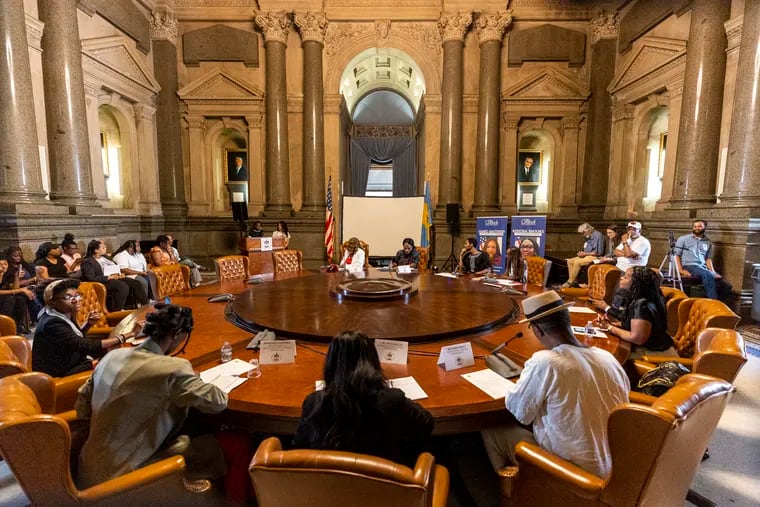
As the nation approaches what’s arguably its second Independence Day, Juneteenth, I can’t help but ponder the wrongheaded way we often think about reparations.
This year will mark the 159th anniversary of June 19, 1865, when thousands of enslaved African Americans found out — 900 days after the Emancipation Proclamation took effect — that they had been legally freed under federal law. Even before that day, the nation has been gripped by the debate over reparations, or how to compensate enslaved Black Americans and their descendants for the nation’s original sin.
As an African American man who was born, raised, and has lived his entire life in our city, I greeted the news about the Philadelphia Reparations Task Force with great skepticism. Much of the media coverage about reparations focuses on “slavery’s lingering impact on the Black community.”
But I have a serious problem with those who use a system that was dismantled almost 200 years ago to paint the picture of my people as victims who are so weak-willed, so traumatized, and so haunted “by the peculiar institution” that we can’t make headway in American society.
We are not victims, we are victors — and I take issue with anyone, male, female, Democrat or Republican, who tries to make us see ourselves otherwise.
In Philadelphia, one can definitely make the argument that racism has caused great harm to the city’s Black community. Mass incarceration, redlining, and educational apartheid are all problems that — despite all of the various programs supposedly targeting those ills — remain pervasive.
» READ MORE: It’s no easier for Black Philadelphians to become homeowners now than it was 30 years ago
But let’s look at what the Philadelphia Reparations Task Force intends to do regarding reparations, and how it proposes to do it.
The task force identifies those eligible for reparations as “Black and African American descendants of enslaved Africans in the United States, the descendants of Black and Negro and Colored Americans since 1865, and the descendants of American Freedmen emancipated from slavery, and may include identified ‘Blacks’ and ‘African Americans’ of mixed race or heritage so long as one of their native born American parents is a due member of the descendant group.”
As to who would pay reparations to the descendant group, here’s where it gets complicated. Reparations, the task force says, should come from “the churches, universities, units of government, families and family estates, and businesses who were enslavers, pillagers, ravagers, and thieves of land and property.”
Frankly, each of those entities that directly benefited from slavery pre-emancipation may no longer exist or have died out. Those surviving family estates, businesses, and universities might not have the financial means to pay reparations in an amount that would change much for our people.
And while we’re talking about families and their estates, let’s not exclude free Black Americans who enslaved their own people. And what about the African tribes who were also part of the slave trade? Shouldn’t they chip some funds into the reparations pot?
If we keep peeling this onion, things could get messy.
Let’s look at what is realistic that would have a significant and positive impact on Black Philadelphia’s economic future.
So let’s look at what is realistic, and what would have a significant and positive impact on Black Philadelphia’s economic future and help dramatically reduce violent crime.
Last year, Gov. Josh Shapiro signed an executive order directing up to $400 million in federal dollars over five years to reimburse organizations that train new infrastructure workers on the job. The money is coming from $19 billion in federal funds from two federal programs for infrastructure projects.
According to reports, “organizations doing infrastructure work — such as repairing roads and bridges, replacing lead pipes and expanding high-speed internet — could receive up to $40,000 for each new worker they train. A maximum of $400,000 could be reimbursed through the program, which will be managed by the Pennsylvania Department of Labor and Industry.” (Those of us who know our history may be struck by the number 40 in that figure — reminiscent of the “40 acres and a mule” emancipated African Americans were supposed to have been given by the federal government, but never received.)
I say let’s focus those training efforts on Black citizens returning from incarceration and others who may have committed low-level offenses in the criminal justice system. Let’s help this cohort — who are disproportionately represented in the system and often denied the opportunity to gain meaningful work — a chance to learn how to do these infrastructure jobs. These are the kinds of jobs that sustain families and put things like buying a home within reach. This approach, and other initiatives like it, would have a bigger and more lasting impact on Black Philadelphians than direct reparations payments.
As African Americans, we can’t disregard the power of our votes, and that means demanding the Democratic Party live up to its commitments to our community. So many Philadelphia ills can be traced to decades of what’s essentially been one-party rule. The Democrats have taken our support for granted for far too long and given back far too little in return.
Six months into her tenure, Mayor Cherelle L. Parker seems to have her mind and heart in the right place. Let’s see if those progressive elected officials who talk about racial justice put the money where all the talk is. No more money for politically connected community programs of questionable efficacy. Put city money into education for those who need it so they can lift themselves, their families, and our communities to a level of serious sustainability.
I don’t view reparations the same way a lot of my people might see it. But it’s time for the local, state, and federal government to agree on a realistic, workable, mess-free way to right the wrongs that still affect Black Philadelphia.
Larry Miller is a former police reporter for the Philadelphia Tribune.


